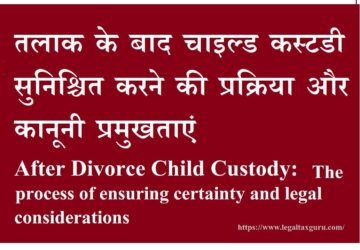Section-498A Use And Misuse
To start with first we have to look that what this word marriage means. ‘Marriage is the voluntary union for life of one man and one woman to the exclusion of all others.’ It is a social institution where husband has the responsibility to take care and maintain his wife. He cannot neglect his duties. But on this great institution a stigma called ‘dowry’ still exists. Women are ill-treated, beating divorced, killed, harassed, for the simple reason that they didn’t brought dowry
For safeguarding the interest of woman against the interest of woman against the cruelty they face behind the four walls of their matrimonial home, the Indian Penal Code,1860(herein after referred to as IPC.) was amended in 1983 and inserted Section 498A which deals with ‘Matrimonial Cruelty’ to a woman.

Matrimonial Cruelty in India is a cognizable, non bailable and non-compoundable offence (In Andhara Pradesh, offence is compoundable). It is defined in Chapter XXA of Indian Penal Code under Section 498A.
Section 113-A of Indian Evidence Act,
Section. 113-A, Presumption as to dowry death- When the question is whether a person has committed the dowry death of a woman.
Explanation- For the purpose of this section ‘dowry death’ shall have the same meaning as in section 304-B of the Indian Penal Code 1860.
The object for which section 498A of Indian Penal Code was introduced is amply reflected in the Statement of Objects and Reasons while enacting Criminal Law (Second Amendment) Act No. 46 of 1983. As clearly stated therein the increase in number of dowry deaths is a matter of serious concern.
Jagdish Chander vs. State of Haryana,1988 Cr. LJ 1048 (P&H) in this case held that Drinking and late coming habits of the husband coupled with beating and demanding dowry have been taken to amount to cruelty within the meaning of this section, but this section has been held not to include a husband who merely drinks as a matter of routine and comes home late[
Meaning of Cruelty:
Cruelty mean as wilful and unjustifiable conduct of such character as to cause danger to life, limb or health, bodily or mental, or as to give rise to a reasonable apprehension of such a danger.
To attract the offence under section 498a of ipc it must be established that the cruelty or harassment to wife was to force her to cause bodily injury to herself or to commit suicide or the harassment was to compel her to fulfil illegal demand for dowry
It was held in ‘Kaliyaperumal vs. State of Tamil Nadu 2004 (9) SCC 157; 2004 SCC(Cr) 1417; 2003 AIR(SC)’, that cruelty is a common essential in offences under both the sections 304B and 498A of Indian Penal Code. The two sections are not mutually inclusive but both are distinct offences and persons acquitted under section 304B for the offence of dowry death can be convicted for an offence under sec.498A of Indian Penal Code.
In the case of ‘Inder Raj Malik vs. Sunita’ , it was held that the word ‘cruelty’ is defined in the explanation which inter alia says that harassment of a woman with a view to coerce her or any related persons to meet any unlawful demand for any property or any valuable security is cruelty.
In Gananath Pattnaik Vs State of Orissa 2002 SCC (Cri) 461, it was held that mental torture or abnormal behaviour my amount to cruelty.
The flowing cruelty covered under this section 498a of IPC:-
(a) Cruelty by vexatious litigation
(b) Taking away children
(c) Cruelty by persistent demand
(d) Cruelty by extra-marital relations
(e) Harassment for non-dowry demand
(f) Cruelty by non-acceptance of baby girl
(g) Cruelty by false attacks on chastity
(h) (Cruelty by deprivation and wasteful habits
cruelty within the meaning of section 113-A of Evidence Act,1872 also arose making the husband guilty of abetment of suicide within the meaning of section 306 of Indian penal code where the husband had illicit relationship with another woman and used to beat his wife making it a persistent cruelty within the meaning of Explanation (a) of section 498A of IPC.
Allegation of Misuse of Section 498A/ Misuse of Section 498 A in Modern World
For the past few years the rise in modernisation, education, and the new found independence the radical feminist has made 498A of IPC a weapon in her hands. High Court and Supreme Court In India Repeatedly accepted that Many a hapless husbands and in laws have become victims of their daughter-in-laws. Most cases where Section 498A is invoked turn out to be false as they are mere blackmail attempts by the wife or her close relatives when faced with a strained marriage. In most cases 498A complaint is followed by the demand of huge amount of money to settle the case out of the court.
A violation of section 498a , its goals and its aims is on the rise with the woman frivolously making false allegations against their husbands with the purpose of getting rid of them or simply hurting the family.
The abuse of section 498a is rapidly increasing and the women often well- educated know that this section is both cognizable and non-bailable and impromptu works on the complaint of the woman and placing the man behind bars. Like in the case of Savitri Devi v Ramesh Chand & Ors II (2003) DMC 328, the court held clearly that there was a misuse and exploitation of the provisions to such an extent that it was hitting at the foundation of marriage itself and proved to be not so good for health of society at large. The court believed that authorities and lawmakers had to review the situation and legal provisions to prevent such from taking place.
Constitution Validity of Section 498-A of IPC
Krishan Lal V Union of India 1994 Cr LJ 3472 (P&H) it was contended that this section Section 498-a of Indian Penal Code is therefore, not arbitrary and it is not violative of Article 14 of the Constitution. And In other case In ‘Inder Raj Malik and others vs. Mrs. Sumita Malik it was contended that this section is ultra vires Article 14 and Article 20 (2) of the Indian Constitution. Act which also deals with similar types of cases; therefore, both statutes together create a situation commonly known as double jeopardy. But Delhi High Court negatives this contention and held that this section does not create
situation for double jeopardy. Section 498A of Indian Penal Code is distinguishable from section 4 of the Dowry Prohibition Act 1961 because in the latter mere demand of dowry is punishable and existence of element of cruelty is not necessary, whereas section 498-A deals with aggravated form of the offence. It punishes such demands of property or valuable security from the wife or her relatives as are coupled with cruelty to her.
Hence a person can be prosecuted in respect of both the offences punishable under section 4 of the Dowry Prohibition Act 1961 and this section.
Section 498a of Indian Penal code gives wide discretion to the courts in the matters of interpretation of the words occurring in the laws and also in matters of awarding punishment. This provision is not ultra vires. It does not confer arbitrary powers on courts.
Conclusion and Suggestion
Looking into the recent observations and the increase in the misuse of Section 498a, The Legislature should be certain amendments which should be brought up in this law. Section 498a only provides for the remedy to woman only and these days it is being used as a ‘brahamastra’ by the woman. It is a highly debatable issue these days, if this problem is not solved by legislation it may become a bane for the society. People’s trust over the judiciary will come to an end. So it’s high time that this Section be amended and some changes like mentioned below should be brought up in this law.
- Need of the create Family Counselling Centres in across the country to help those aggrieved families and increase Role of Women NGOs.
- Time bound Investigation and Trial- A time bound Investigation and Trial of 498(a) cases will not only ensure justice for the innocents that have been implicated in false charges, it will also lead to prompt redressal of the grievances of real dowry victims
- Definition of Mental Cruelty in law
- should be made compulsory Registration of marriages and gifts exchanged at the time of marriage
- he main reason of Section 498a being misused to harass innocent is its non-bailable nature. This section should be made bailable.
- No unnecessary arrests :- Arrest warrant should be issued only against the main accused and only after cognizance has been taken. Husband family members should not be arrested
- Changes in Court Proceedings- The Courts should, as far as possible, make use of the modern aids to simplify and accelerate court proceedings, and government should be ought to provide, as far as possible, adequate funds for the Judiciary for Section 498a cases.
- Penalize corrupt Investigation Officers
Other Related Post
भारतीय दंड सहिता धारा 498-ए घरेलू (हिंसा और उत्पीडन )का दुरुपयोग




sangita kumari
very useful section but misuse of section 498a should be stopped by law